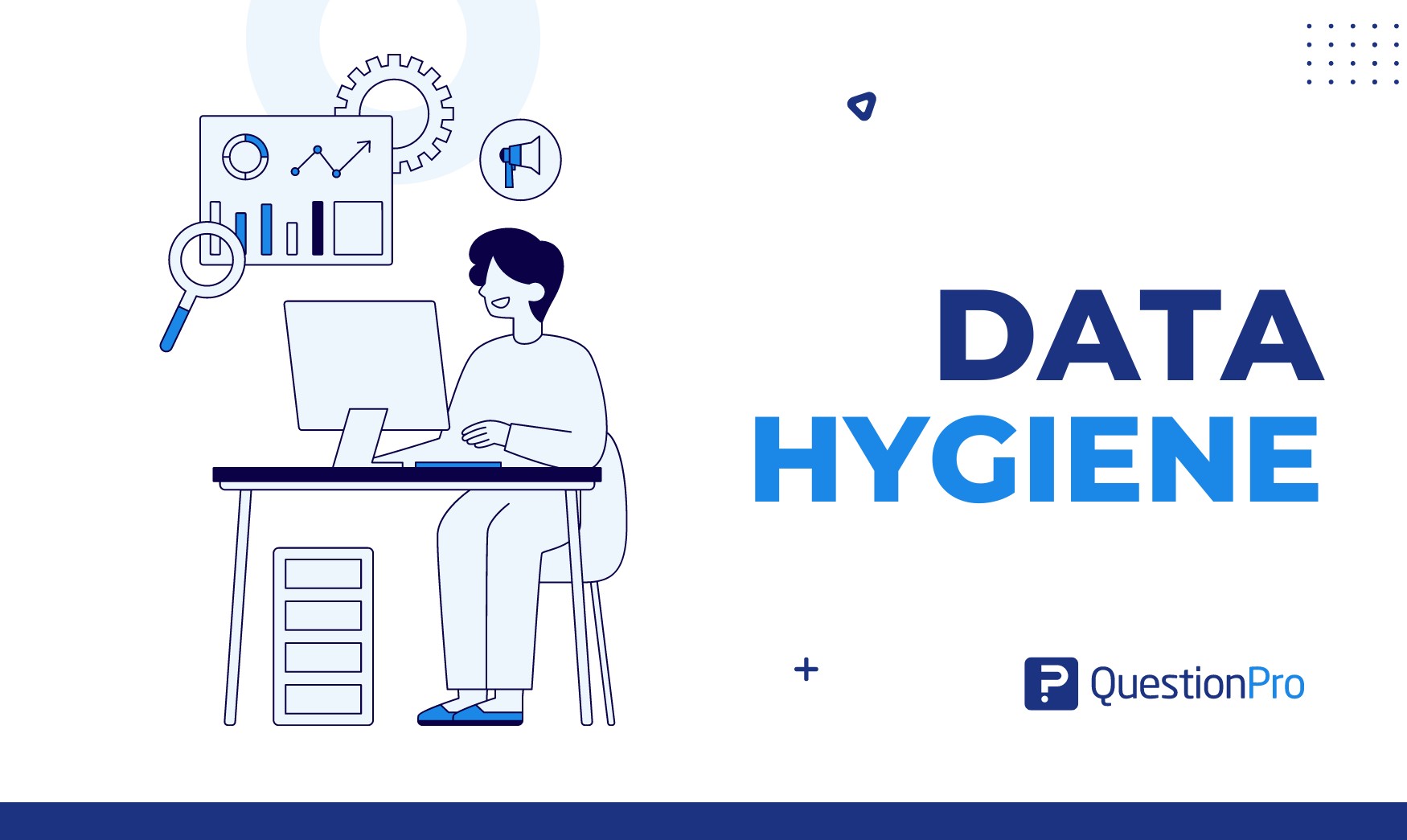
Data is like a tidy house; it needs regular cleaning to stay organized and useful. This process is what we call data hygiene. Think of it as giving your digital information a good scrubbing. It involves ensuring your data is accurate, up-to-date, and error-free.
Just like keeping your room clean and organized makes life easier, maintaining good data hygiene makes your digital life smoother. It ensures your data is trustworthy, helps you make better decisions, and ultimately keeps your digital space neat and tidy.
This blog will explore what it is, why it matters, and some easy-to-follow best practices.
What is Data Hygiene?
Data hygiene refers to the practices and processes involved in maintaining data’s cleanliness, accuracy, and quality. Good data hygiene is essential for businesses and organizations that rely on accurate data for decision-making, analysis, and overall operational efficiency.
By prioritizing it, organizations can enhance the reliability of their data. It improves decision-making processes and creates trust in the information they rely on for various purposes. Strong data hygiene practices help prevent issues such as:
- Outdated information
- Inconsistencies and
- inaccuracies
Those issues could lead to misinformed decisions and operational inefficiencies.
Why is Data Hygiene Important?
The importance of data hygiene cannot be overstated in today’s data-driven world. Here are several key reasons why maintaining good data hygiene is important for businesses and organizations:
Reliable Decision-Making
Good decisions start with good data. Imagine trying to navigate a city with a map full of inaccuracies. It would be a frustrating and confusing experience. The same goes for your business decisions. Clean data provides a reliable roadmap for informed choices.
Streamlined Operations
Cluttered and inconsistent data can lead to operational chaos. With proper data hygiene, you can eliminate errors and redundancies, creating a smoother workflow. This efficiency not only saves time but also improves your team’s overall productivity.
Customer Trust and Satisfaction
Your customers expect you to know them and to get things right. Clean data ensures that your customer interactions are based on accurate information, building trust and satisfaction. It’s like remembering a friend’s birthday—it shows you care about the details.
Cost Savings
Errors in your data can be costly. From shipping mistakes to financial miscalculations, the consequences of inaccurate information can quickly add up. Investing in data hygiene is an investment in avoiding unnecessary expenses.
Practical Benefits of Data Hygiene
Let’s explore the practical benefits of embracing data hygiene, ensuring your data remains in its prime condition for optimal performance and success.
- Compliance with Regulations: Many industries have data protection regulations in place. It helps you comply with these regulations and protects you from legal consequences.
- Effective Marketing and Sales: Clean data is the secret sauce of successful marketing and sales efforts. It allows you to target the right audience with personalized messages, increasing the effectiveness of your campaigns.
- Improved Productivity: Your team can be more productive when data errors do not bog them down. Clean data allows employees to focus on strategic tasks instead of fixing mistakes.
- Security: It includes security measures to safeguard sensitive information. This helps prevent security breaches and keeps your data safe from unauthorized access.
Best Practices of Data Hygiene to Apply
When it comes to data hygiene, getting it right is crucial for informed decision-making, operational efficiency, and maintaining the trust of your customers. Here are some data hygiene best practices to ensure your data is clean, accurate, and reliable:
Evaluate Data Health with a Comprehensive Audit
Begin by understanding the current state of your customer data. A comprehensive data audit helps establish a baseline, allowing you to quantify the accuracy and quality of your data. Identify the systems used for data collection, storage, and usage. Determine necessary data fields, ensuring your organization collects only what is essential for compliance and efficiency.
Champion Data Integrity Through Governance
Adopt a principled approach to managing data throughout its lifecycle with data governance. Map out how data flows through your business processes to pinpoint potential entry errors and communication mistakes. Assess data movement, including collection points, storage locations, and user access, to identify areas of improvement and security vulnerabilities.
Enforce Consistency in Data Input
Create and enforce rules for data input across the organization. Standardize naming conventions, formatting, and other constraints through training programs. Define rules for abbreviations, capitalizations, salutations, numbers, and address types. Keep data entry simple to reduce the risk of human error and enhance overall consistency.
Explore the Power of Data Cleansing Tools
Leverage data monitoring and cleansing tools to identify and rectify inaccuracies or messy data. These tools, utilizing natural language searching, data modeling, and machine learning, can uncover patterns and anomalies.
Explore options like DeDupley for duplicate removal or Experian Data Quality for bulk email, address, and telephone number checks. Automation of manual processes through such tools helps minimize mistakes.
Enhance data security with a data loss prevention tool like Nightfall. Automated scans for sensitive information in structured and unstructured data can detect formatting errors or dirty data.
Create Collaboration, Eliminate Siloes
Encourage consistent sharing of data among internal teams to break down siloes. Collaboration, especially between departments like sales and marketing, significantly improves data hygiene. Forbes highlights the impact of poor CRM prospect data on sales, emphasizing the need for cohesive data-sharing practices.
Empower Teams with Training and Tools
Empower your teams through comprehensive training programs that emphasize data governance principles. Establish and enforce standardized data input procedures across the organization. Invest in effective data cleansing tools and data loss prevention solutions to automate processes, saving both time and money.
Data Hygiene VS Data Quality
While both data hygiene and data quality relate to the overall management of data, they address different aspects and have distinct focuses within the realm of data management. Here’s a breakdown of the key differences between data hygiene and data quality:
Definition
- Data Hygiene: Focuses on data’s cleanliness, accuracy, and reliability. It involves practices and processes to ensure that the data is free from errors, inconsistencies, and inaccuracies.
- Data Quality: Encompasses a broader range of characteristics related to the overall excellence of data. It includes accuracy, completeness, consistency, timeliness, and relevance. It is a comprehensive measure of how well data meets the needs and requirements of its intended use.
Scope
- Data Hygiene: Primarily concerned with eliminating errors, duplicates, and inaccuracies within the data. It often involves specific practices like standardizing data entry, removing duplicates, and correcting inaccuracies.
- Data Quality: Encompasses a wider range of aspects, including the overall fitness of data for its intended purpose. It addresses issues such as completeness, consistency, and timeliness in addition to the accuracy and cleanliness targeted by data hygiene.
Focus Areas
- Data Hygiene: Specific practices related to cleaning and maintaining the accuracy of data, such as standardizing formats, removing duplicates, and ensuring consistent data entry practices.
- Data Quality: Encompasses a holistic view of data, addressing various dimensions like accuracy, completeness, consistency, timeliness, and relevance. It involves a more comprehensive assessment of data fitness for use in different contexts.
Objectives
- Data Hygiene: Aims to eliminate errors, inconsistencies, and inaccuracies within the data to enhance its reliability and accuracy.
- Data Quality: Strives for a high standard across multiple dimensions, ensuring that data is not only accurate but also complete, consistent, timely, and relevant to the intended use.
Application
- Data Hygiene: Often applied in contexts where the primary concern is the accuracy and cleanliness of data, such as marketing databases, customer records, or any system where errors can have significant impacts.
- Data Quality: Applicable in a broader range of contexts, including business intelligence, analytics, decision-making processes, and compliance. It addresses the overall fitness of data for various uses across an organization.
While data hygiene is a subset of data quality, focusing specifically on the accuracy and cleanliness of data, data quality is a more comprehensive concept that considers various dimensions to ensure that data meets high standards for its intended purposes.
Both are crucial for organizations seeking reliable insights and making informed decisions based on their data.
How QuestionPro Can Help in the Data Hygiene Process?
QuestionPro is a comprehensive survey and research platform that enhances the data hygiene system through its features and capabilities. While QuestionPro primarily focuses on survey research, it indirectly contributes to data hygiene by ensuring accurate and reliable data collection. Here’s how QuestionPro helps with this process:
Survey Design and Question Validation
QuestionPro provides tools to create well-structured surveys with validated questions. Designing surveys with clear and standardized questions helps ensure consistent and accurate data input from respondents.
Data Validation and Quality Checks
The platform allows for the implementation of data validation rules, ensuring that respondents provide accurate and valid information. This feature contributes to the overall data accuracy by preventing the submission of incorrect or inconsistent responses.
Elimination of Duplicate Responses
QuestionPro offers options to prevent duplicate records in surveys. This feature helps maintain data accuracy by eliminating the possibility of redundant or duplicated information, contributing to a cleaner dataset.
Customized Data Reporting and Analysis
The platform provides robust reporting and analytics tools. By allowing users to filter, segment, and analyze survey data, QuestionPro helps in identifying and addressing any inconsistencies or errors in the collected information.
Data Security and Compliance
QuestionPro prioritizes data security and compliance with industry standards. Ensuring secure data collection and storage is crucial for maintaining data hygiene, especially when dealing with sensitive information. Compliance with regulations contributes to the overall quality and integrity of the data.
Creating Survey With QxBot
QxBot boosts data precision in surveys with its AI-driven approach. Ensuring clear and accurate questions minimizes misunderstandings and maintains consistency among participants. QxBot’s automated processes contribute to well-structured surveys, enabling researchers to draw dependable conclusions confidently.
User Training and Support
QuestionPro offers user training and support resources. Proper training ensures that users understand best practices for survey design and data collection, reducing the risk of errors caused by user-related issues.
Conclusion
Data hygiene is the key to maintaining a healthy and reliable digital space. By keeping your data accurate and clean, you pave the way for better decision-making, streamlined operations, and customer satisfaction.
Follow these simple best practices, and you’ll ensure that your digital house stays in top-notch condition, ready for whatever insights and opportunities come your way. While QuestionPro may not be a specialized data hygiene tool, its role in survey design, data validation, and integration with other tools indirectly supports the principles of data hygiene.
By promoting accurate and useful data collection, QuestionPro contributes to maintaining the cleanliness and quality of the data organizations gather through surveys and research. Contact QuestionPro for further information or for a free trial.







